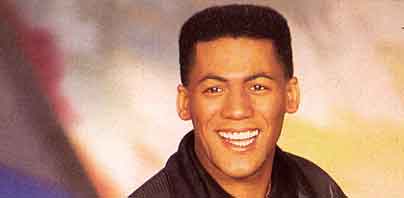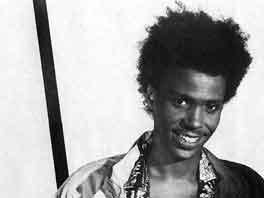Very hectic time for me – and it's only gong to be worse for the next week or so.
Besides trying to launch my own company, I've got other fish to fry. Like my son's graduation from 5th grade. Friends visiting from out of town. Teacher meetings. Job applications with pressing deadlines.
And oh yeah. An audition for "Jeopardy" in Cleveland on Thursday morning. I'll keep you posted. (Messages of support are always appreciated)
In the words of Christopher Robin: Bisy, Bisy, Bisy, Backson.
Tuesday, June 10, 2008
Tuesday, June 3, 2008
Two-Fer-Tuesday : The George Benson Effect


George Benson's easy transition from respected jazz guitarist to multi-million dollar pop star raised a lot of eyebrows.
Sure, there were a lot of jazz purists who looked down on Benson for having "sold out." But it inspired several others to make a similar jump – with differing results.
 Bernard Wright was a 16-year-old keyboard prodigy from Jamaica, Queens when he recorded 'Nard (1981) on GRP Records. Most of the material on the album was was what could either be described as funk jazz or Gil Scott Heron-lite. But he had one shining moment on the album that displayed his potential as a straight-ahead jazz pianist: A respectable version of Miles Davis' "Solar" with bassist Buster Williams and drummer Roy Haynes.
Bernard Wright was a 16-year-old keyboard prodigy from Jamaica, Queens when he recorded 'Nard (1981) on GRP Records. Most of the material on the album was was what could either be described as funk jazz or Gil Scott Heron-lite. But he had one shining moment on the album that displayed his potential as a straight-ahead jazz pianist: A respectable version of Miles Davis' "Solar" with bassist Buster Williams and drummer Roy Haynes.By the next few albums, however, Wright had abandoned jazz entirely to focus on r&b. And it almost paid off. Signed to Manhattan records, then a new Blue Note subsidiary focusing on crossover artists, his 1985 release Mr. Wright included his biggest hit, the utterly infectious "Who Do You Love." The single rose to the No. 6 on the R&B charts and pushed the album to No. 25 on the same charts. But two more albums later, Wright was forced to the sideline as a session musician who has played with the likes of Chaka Khan, Roberta Flack and Miles Davis.
Play "Who Do You Love" by Bernard Wright
As always, since this was the 80s after all, I give you the video.
Born in South Africa, Butler also played the hybrid of jazz and r&b that was popular in the 80s. But it's definitely fits more into the smooth/AC genre – especially his 1987 hit "Holding On." Despite the fact that the song was designed to appeal to Reaganite yuppies stuck in traffic on their way to work, there are some nice touches in this song: Butler's Benson-like vocalizing accompanying his pretty guitar playing, a nice backing choir and (you should know me by now) the ever-present horns.
Play "Holding On" by Jonathan Butler
Butler has continued to enjoy a successful solo career, recording about a dozen albums over the last two decades – including an album recorded live in his native South Africa last year.
Sunday, June 1, 2008
Soundtrack Sunday– "Walk Hard: The Dewey Cox Story"

For my 100th post, which comes almost exactly six months after I launched this blog, I'm focusing on a soundtrack of rather recent vintage.
Released late last year and making barely a dent at the box office, Walk Hard: The Dewey Cox Story (2007) stopped the string of hits from producer Judd Apatow, the guy behind Knocked Up (2007) and Super Bad (2007), among other films.
Why did it flop so miserably? Well, it had a few strikes against it. It was a music-oriented movie, which can be hit or miss with the public. It wasn't that funny, despite a few clever moments. And it was a bit schizophrenic: Sophomoric and scatological one moment, obtuse and filled with sophisticated in-jokes the next. It also couldn't decide whether to make the title character likable or a total buffoon.
I also think it was too narrowly focused in its satire. Most of the jokes were take offs from Ray (2004) or Walk The Line (2005). There were so many other great musical biopics to make fun of. What about La Bamba (1987), The Doors (1991), What's Love Got To Do With It? (1993)? So many opportunities, so much wasted celluloid. Heck, the non-satirical That Thing You Do (1996) had a broader focus.
But that's not the point of today's discussion.
My favorite part of the movie was Cox's Brian Wilson phase when he decides to record the perfect song with a full orchestra, multiple sitarists, bushmen playing diggeroos and a bleating goat. Let's not forget the trampoline, substituting for the sandbox. The song itself was so Wilsonesque that it almost seemed like a Smile outtake.
I found out why when the final credits rolled. The co-writer of the song was none other than Van Dyke Parks, who actually collaborated with Wilson on Smile (and walked away when it was clear to him that Wilson was never going to finish it – at least as a Beach Boy).
Play "Black Sheep" by John C. Reilly
Parks isn't the only musical hotshot on the soundtrack. Not in the slightest. Because the title track – and Cox's signature hit – was written by that paramour of power pop, Marshall Crenshaw, along with Reilly, Apatow and director Jake Kasdan. I'm surprised that the song – or any of the others on the fairly solid soundtrack – didn't at least get a Oscar nomination instead of all those craptacular songs from Enchanted (2007).
Play "Walk Hard" by John C. Reilly
As a bonus, I've tacked on one of my favorite scenes from the movie: Cox conversing with the four "Beatles" and contributing mightily to their eventual break-up. Paul Rudd as John Lennon is a real hoot.
Subscribe to:
Posts (Atom)



